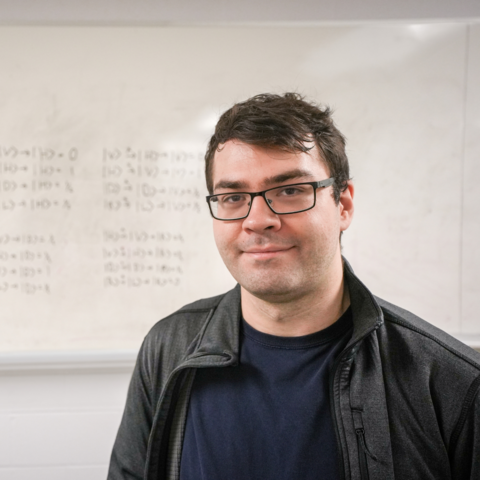

Science that matters: Master’s student prepares for an imaginative career in the growing quantum industry
By Alyana Versolatto
Graduate Recruitment Officer
Grant Brassem is part of the third cohort of students to embark on the Quantum Technology specialization within the Master of Science in Physics program. This new 12-month, course-based degree lets students push the frontiers of knowledge and is offered by the Department of Physics and Astronomy, the Institute for Quantum Computing (IQC) and the Transformative Quantum Technologies Program (TQT) at the University of Waterloo.
No stranger to Waterloo, Brassem completed his undergraduate degree in Mathematical Physics, studying a combination of theoretical physics and high-level mathematics. Afterward, he completed a master’s at Western University focusing on theoretical nano-plasmonic systems including waveguides, metallic nanoparticles, and quantum dots. While Brassem enjoyed it, he wanted to delve into the practical side of physics, specifically researching low-temperature physics. When he saw the Quantum Technology program listed on the Waterloo website, he knew it was the perfect fit for him.
“I’d get hands-on experience with the actual software platforms used to run modern laboratory equipment, while simultaneously gaining a strong theoretical background to do the work,” he says.
The in-person nature of the program means he can utilize the state-of-the-art IQC laboratories for independent projects and make meaningful connections with industry mentors, startups, and a community of over 300 quantum researchers. When asked about his career aspirations after graduating, Brassem says he has options, “I’m hoping to get my PhD [probably at Waterloo as well], but I could be tempted if presented with a great offer to work at a lab or quantum startup. The best part of this program is that it gives you a solid foundation to further your career—whether in academia, specialized lab work, or industry.”
Why did you choose a course-based program over a thesis-based program?
The most appealing aspect of the course-based program is that it covers a variety of topics from low-temperature physics to nuclear magnetic resonance, to optics, while also giving me a sense of what I would experience in a PhD program or lab. I also prefer the structure of coursework to open-ended projects since it creates more reliability in my schedule and planning.
What has your experience been like halfway through the program?
The year length means it is compressed, so the workload can be fairly heavy at times. In my first term with two courses and a lab, it felt like my fourth year of studies in my undergrad with a relatively structured schedule. This term I am taking one course, a lab, and an independent project—so there is a great deal more flexibility and variation from week to week. One week I might be learning the software of a specific machine, while the next I might be reading research papers or soldering wires to create connector cables.
What independent project are you working on?
It’s on low-temperature quantum bits (qubits) and their interactions. The project involves cooling a resonator system down to about 1.5 Kelvin, using liquid helium to suppress temperature fluctuations in the qubit. Working alongside Waterloo-based quantum startup, Qubic, and other researchers, I am currently examining the system’s performance. We’re hoping to understand why the system performed better in their internal lab than it does in other experiments. Since resonators are highly sensitive to very small amounts of heat or vibration, even a slight imperfection in the experimental setup can drastically reduce the quality factor.
Are there any professors that have inspired you?
Dr. David Cory taught the lab course in my first term, and I still attend the meeting with his group every Wednesday. He is the principal investigator for the Canada First Research Excellence Fund in Transformative Quantum Technologies and is incredibly knowledgeable about a wide variety of topics. He also gave me great advice about pursuing my PhD and future career prospects.
How do you spend your time outside of your studies at Waterloo?
In my free time, I enjoy playing video games, reading books, and investigating physics or mathematics topics that interest me. I’ve become quite fond of living in Waterloo. I enjoy the ease of public transport like the ION light rail which lets me get around without needing a car, and the variety of good restaurants in the area.
The Master of Science in Physics (Quantum Technology) program runs from September to August of each year, with courses delivered on campus and applications open until the beginning of January. Full scholarships covering tuition and living costs will be offered to a limited number of students. More information can be found on the website.

Grant Brassem (he/him), Master of Science (MSc) in Physics (Quantum Technology) student